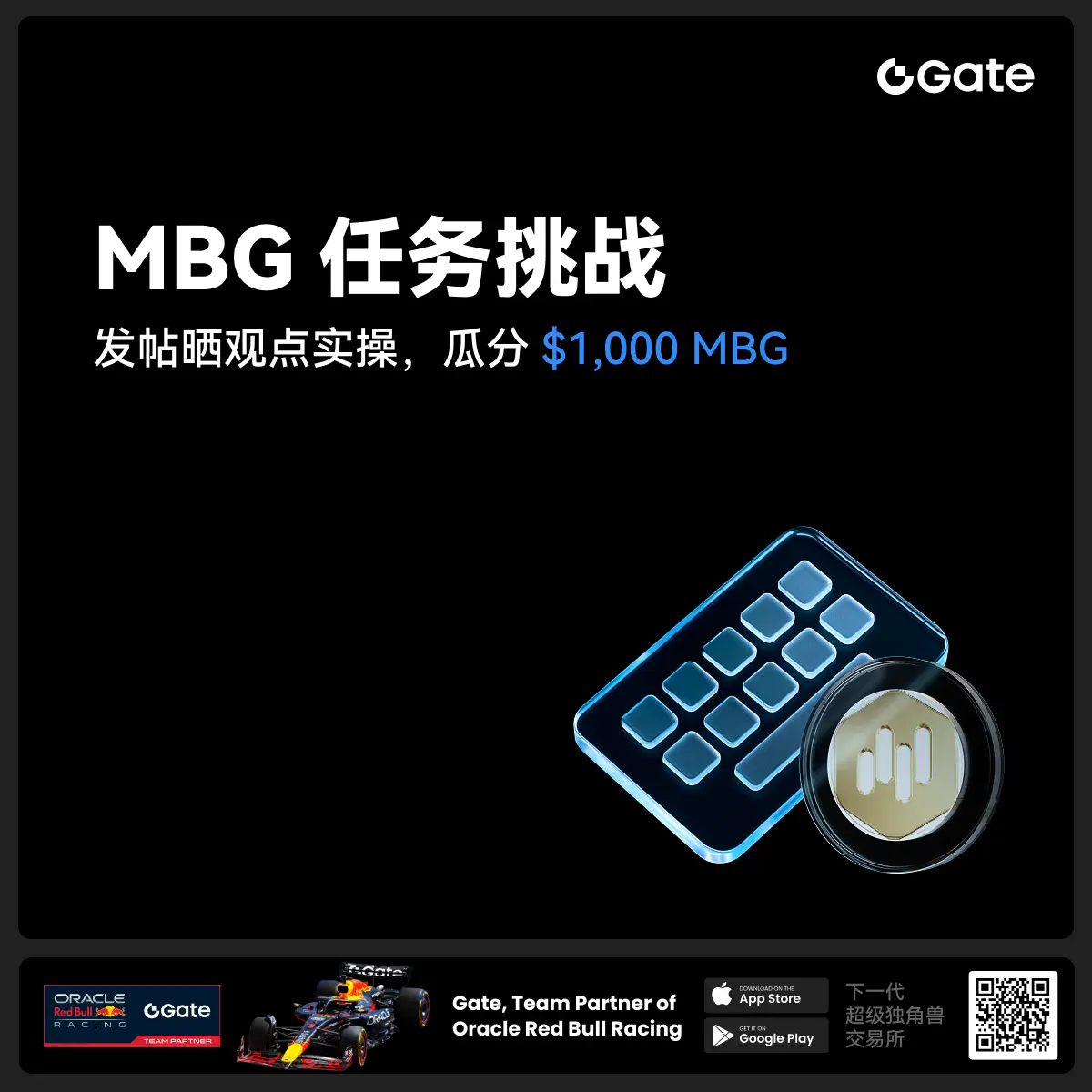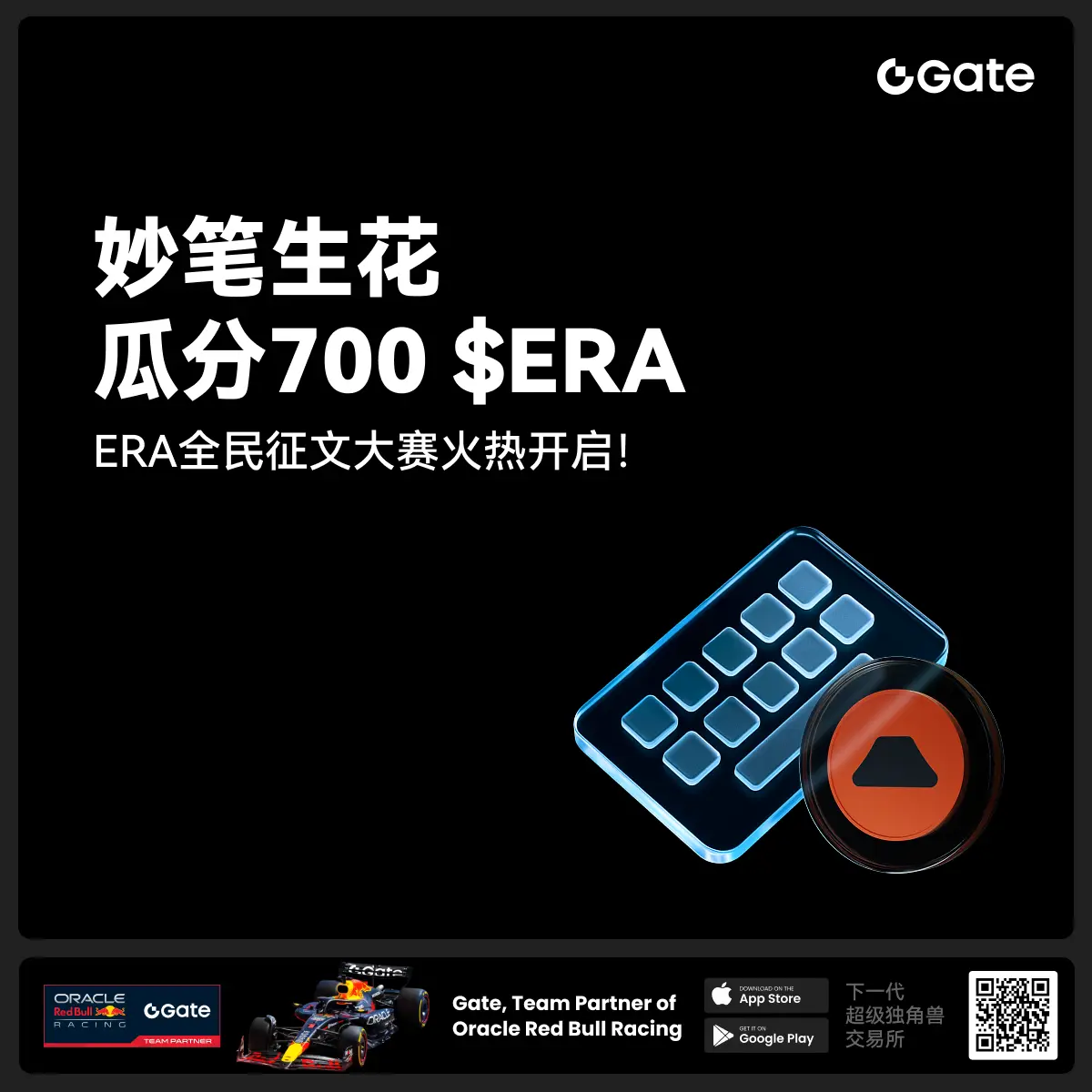- 話題1/3
38664 熱度
40214 熱度
41888 熱度
51239 熱度
21766 熱度
- 置頂
- 📢 Gate廣場 #MBG任务挑战# 發帖贏大獎活動火熱開啓!
想要瓜分1,000枚MBG?現在就來參與,展示你的洞察與實操,成爲MBG推廣達人!
💰️ 本期將評選出20位優質發帖用戶,每人可輕鬆獲得50枚MBG!
如何參與:
1️⃣ 調研MBG項目
對MBG的基本面、社區治理、發展目標、代幣經濟模型等方面進行研究,分享你對項目的深度研究。
2️⃣ 參與並分享真實體驗
參與MBG相關活動(包括CandyDrop、Launchpool或現貨交易),並曬出你的參與截圖、收益圖或實用教程。可以是收益展示、簡明易懂的新手攻略、小竅門,也可以是現貨行情點位分析,內容詳實優先。
3️⃣ 鼓勵帶新互動
如果你的帖子吸引到他人參與活動,或者有好友評論“已參與/已交易”,將大幅提升你的獲獎概率!
MBG熱門活動(帖文需附下列活動連結):
Gate第287期Launchpool:MBG — 質押ETH、MBG即可免費瓜分112,500 MBG,每小時領取獎勵!參與攻略見公告:https://www.gate.com/announcements/article/46230
Gate CandyDrop第55期:CandyDrop x MBG — 通過首次交易、交易MBG、邀請好友註冊交易即可分187,500 MBG!參與攻略見公告:https://www.gate.com/announcements
- 📢 #Gate广场征文活动第三期# 正式啓動!
🎮 本期聚焦:Yooldo Games (ESPORTS)
✍️ 分享獨特見解 + 參與互動推廣,若同步參與 Gate 第 286 期 Launchpool、CandyDrop 或 Alpha 活動,即可獲得任意獎勵資格!
💡 內容創作 + 空投參與 = 雙重加分,大獎候選人就是你!
💰總獎池:4,464 枚 $ESPORTS
🏆 一等獎(1名):964 枚
🥈 二等獎(5名):每人 400 枚
🥉 三等獎(10名):每人 150 枚
🚀 參與方式:
在 Gate廣場發布不少於 300 字的原創文章
添加標籤: #Gate广场征文活动第三期#
每篇文章需 ≥3 個互動(點讚 / 評論 / 轉發)
發布參與 Launchpool / CandyDrop / Alpha 任一活動的截圖,作爲獲獎資格憑證
同步轉發至 X(推特)可增加獲獎概率,標籤:#GateSquare 👉 https://www.gate.com/questionnaire/6907
🎯 雙倍獎勵機會:參與第 286 期 Launchpool!
質押 BTC 或 ESPORTS,瓜分 803,571 枚 $ESPORTS,每小時發放
時間:7 月 21 日 20:00 – 7 月 25 日 20:00(UTC+8)
🧠 寫作方向建議:
Yooldo
- 🎉Gate 2025 上半年社區盛典:內容達人評選投票火熱進行中 🎉
🏆 誰將成爲前十位 #Gate广场# 內容達人?
投票現已開啓,選出你的心頭好
🎁贏取 iPhone 16 Pro Max、限量週邊等好禮!
📅投票截止:8 月 15 日 10:00(UTC+8)
立即投票: https://www.gate.com/activities/community-vote
活動詳情: https://www.gate.com/announcements/article/45974
- 📢 #Gate广场征文活动第二期# 正式啓動!
分享你對 $ERA 項目的獨特觀點,推廣ERA上線活動, 700 $ERA 等你來贏!
💰 獎勵:
一等獎(1名): 100枚 $ERA
二等獎(5名): 每人 60 枚 $ERA
三等獎(10名): 每人 30 枚 $ERA
👉 參與方式:
1.在 Gate廣場發布你對 ERA 項目的獨到見解貼文
2.在貼文中添加標籤: #Gate广场征文活动第二期# ,貼文字數不低於300字
3.將你的文章或觀點同步到X,加上標籤:Gate Square 和 ERA
4.徵文內容涵蓋但不限於以下創作方向:
ERA 項目亮點:作爲區塊鏈基礎設施公司,ERA 擁有哪些核心優勢?
ERA 代幣經濟模型:如何保障代幣的長期價值及生態可持續發展?
參與並推廣 Gate x Caldera (ERA) 生態周活動。點擊查看活動詳情:https://www.gate.com/announcements/article/46169。
歡迎圍繞上述主題,或從其他獨特視角提出您的見解與建議。
⚠️ 活動要求:
原創內容,至少 300 字, 重復或抄襲內容將被淘汰。
不得使用 #Gate广场征文活动第二期# 和 #ERA# 以外的任何標籤。
每篇文章必須獲得 至少3個互動,否則無法獲得獎勵
鼓勵圖文並茂、深度分析,觀點獨到。
⏰ 活動時間:2025年7月20日 17
- 📢 ETH衝擊4800?我有話說!快來“Gate廣場”秀操作,0.1 ETH大獎等你拿!
牛市預言家,可能下一個就是你!想讓你的觀點成爲廣場熱搜、贏下ETH大獎?現在就是機會!
💰️ 廣場5位優質發帖用戶+X瀏覽量前5發帖用戶,瓜分0.1 ETH!
🎮 活動怎麼玩,0門檻瓜分ETH!
1.話題不服來辯!
帶 #ETH冲击4800# 和 #ETH# 在 廣場 或 K線ETH下 圍繞一下主題展開討論:
-ETH是否有望突破4800?
-你看好ETH的原因是什麼?
-你的ETH持倉策略是?
-ETH能否引領下一輪牛市?
2. X平台同步嗨
在X平台發帖討論,記得帶 #GateSquare# 和 #ETH冲击4800# 標籤!
把你X返連結提交以下表單以瓜分大獎:https://www.gate.com/questionnaire/6896
✨發帖要求:
-內容須原創,字數不少於100字,且帶活動指定標籤
-配圖、行情截圖、分析看法加分,圖文並茂更易精選
-禁止AI寫手和灌水刷屏,一旦發現取消獎勵資格
-觀點鮮明、邏輯清晰,越有料越好!
關注ETH風向,創造觀點價值,從廣場發帖開始!下一個牛市“預言家”,可能就是你!🦾🏆
⏰ 活動時間:2025年7月18日 16:00 - 2025年7月28日 23:59(UTC+8)
【立即發帖】 展現你的真知灼見,贏取屬於你的ETH大獎!
Crypto isn’t crashing the American dream; it’s renovating it
Opinion by: Dr. Scott Lehr
In the early 2000s, getting a loan in the United States without verifying your income or assets was possible. It was called a “no-doc” or “low-doc” loan. The aim was to help self-employed or contract workers, but it was widely abused.Today, lenders verify income, assets, debt and employment.
Whether the centralized fraternity likes it or not, the financial world is changing. What once required W-2 wage-and-tax forms, gatekeepers and credit files is now being rebuilt on transparency, autonomy and a blockchain wallet
For the first time, Washington acknowledges that wealth isn’t just traditional, it’s digital. For over a century, the American Dream has been underwritten by one big dream: homeownership. The financial and psychological milestone signals arrival, stability and upward mobility.
What happens when the very definition of wealth starts to evolve? What happens when your balance sheet doesn’t just live in a bank, but also on the blockchain?
The FHFA move: A policy shift with cultural weight
The Federal Housing Finance Agency (FHFA) recently announced that Fannie Mae and Freddie Mac will begin recognizing crypto assets as part of mortgage application assessments.
This subtle but historic move officially brings digital wealth into the realm of traditional home financing, and in doing so, it redefines who qualifies for the American Dream
Crypto didn’t knock on the door of the American Dream. Crypto built a back door and walked in. This new entry point for homeownership is making what inflation and centralized banks had made a pipedream possible.
Most headlines focused on the immediate implications: Crypto holders may no longer need liquid assets to qualify for a mortgage. But the more profound significance is philosophical. The system is no longer asking, “Is crypto real?” It’s admitting, “Crypto is wealth.”
In 2024, Redfin reported that 12% of homebuyers planned to use crypto for down payments, up from just 5% in 2019. Meanwhile, companies are building out lending infrastructure that allows people to use digital assets as collateral without triggering capital gains events.
This isn’t about hype. This is happening. A generation of self-made digital investors has been operating outside the gatekeeper economy. They built wealth without permission, often without traditional employment, and now want in on the most traditional asset of all: real estate
The FHFA decision is more than regulatory. It’s symbolic. It signals a shift from exclusion to integration.
Not just finance, but freedom
Critics are already clutching the rails. They worry that recognizing volatile assets like Bitcoin in mortgage qualification introduces unnecessary risk.
However, crypto enthusiasts know and trumpet that volatility doesn’t equal fraud. Many people defending outdated credit models forget that the 2008 financial crisis was caused not by crypto but by excessive leverage, synthetic debt and a total lack of transparency
Related: US regulator orders Fannie Mae, Freddie Mac to consider crypto for mortgages
Crypto is all about transparency. Wallet balances don’t lie. Smart contracts don’t forge pay stubs. Decentralized finance isn’t perfect, but it doesn’t pretend to be something it’s not. That alone puts it ahead of Wall Street’s shadow banking activity.
This is not just about finances; this is about freedom. It’s about acknowledging that 21st-century wealth doesn’t always come from fiat savings or 401(k)s. Sometimes it comes as a token, a ledger or a digital asset held by someone who refused to wait for traditional finance to validate them. Risk takers and revolutionaries can rejoice!
From roofs to revolutions
The innovation isn’t just in how people buy homes with crypto. It’s in how people use their homes to buy crypto. They’re flipping the traditional model. Real estate used to be the dream. Now, for some, it’s the launchpad.
Yes, that introduces risk. And no, not everyone should use their house as a Bitcoin acquisition engine. That’s where informed regulation matters. We need smarter frameworks that respect innovation while protecting consumers.
The alternative is worse: a financial system that only serves those who conform to outdated paths of wealth creation. Centralized banks often resemble a relic from the past, but it seems some are opening their eyes to what is inevitable.
The new blueprint
This is the new blueprint for the American Dream: Ownership now includes physical and digital assets; creditworthiness reflects onchain transparency, not just paper resumes; and the housing market must evolve with its people, not against them. Crypto isn’t a threat to homeownership. It’s a catalyst for its reinvention.
We don’t need more gatekeepers. We need more bridges. For millions of investors, innovators and digital natives, this new policy bridges where they’ve been building and where they now want to live
Location, location, location is now online, decentralized and transparent.
Crypto isn’t just changing finance. It’s redefining what it means to arrive.
Opinion by: Dr. Scott Lehr.
This article is for general information purposes and is not intended to be and should not be taken as legal or investment advice. The views, thoughts, and opinions expressed here are the author’s alone and do not necessarily reflect or represent the views and opinions of Cointelegraph.